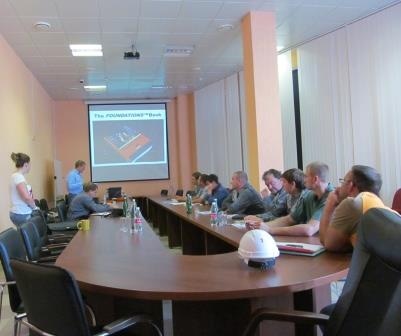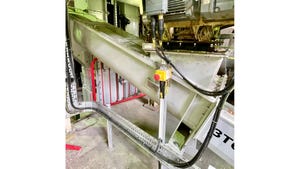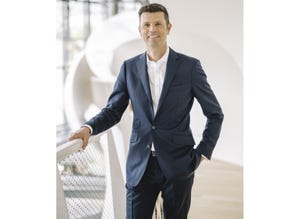July 1, 2015

A global leader in bulk material handling has announced the expansion of its conveyor safety training program, with its first seminar presented in Russia.
Designed to raise the knowledge level and risk awareness of attendees, the groundbreaking session was conducted by Martin Engineering GmbH at the JSC Verhnebakansky Cement Plant in the Krasnodar region. Fifteen employees participated in a two-part program that featured an initial inspection of the facility’s conveyor system, followed by an in-depth one-day classroom event.
Attendees report that the Foundations training program delivered a number of benefits specific to the site, including observations of the existing equipment and instruction on technologies to help improve system performance, reduce downtime and material waste, and minimize hazards to employees.
“We’ve had a presence in the Russian cement industry for a number of years,” observed Michael Tenzer, global business development manager for Martin Engineering GmbH. “But introducing training programs to the Russian market has been a challenge. The language barrier has always been an obstacle, as it can be difficult to find the resources for the type of extremely accurate translation that’s so critical to an industrial setting of this kind. Over time, we’ve developed the necessary language resources and also cultivated the personal and professional relationships that have facilitated excellent communication with our customers.”
According to Tenzer, the driving forces which have helped influence the receptivity of Russian companies include their search for technologies that can contribute to greater system efficiency, with particular interest in energy usage and in reducing carryback and the wide-ranging problems it causes. Another motivator is the need to improve system reliability and extend equipment life through preventive maintenance.
“Although there are a number of factors, it really comes down to a desire to make the material handling systems cleaner, safer, and more productive,” Tenzer continued.
During the initial phase of the training at the Verhnebakansky Cement Plant, Martin Engineering technicians conducted a thorough inspection of the conveyors, chutes, guarding and related components. With a detailed summary in hand for day two, the presenters were able to identify specific issues, separating root causes from symptoms, and introducing the latest technologies available to address problem areas.
“The cement industry in Russia has started to embrace preventive maintenance, rather than reacting to problems as they arise,” said Tenzer. “For example, system operators are recognizing that investing in effective belt cleaning technologies is actually less expensive than not cleaning the belts. In some installations, we’re finding that customers can actually double conveyor belt life with properly-specified and -installed cleaners.”
Dealing with fugitive material is a key component of the Foundations sessions, particularly at entry and exit zones and at transfer points. “Customers are beginning to accept the fact that they don’t have to live with material spillage and dust,” Tenzer said. “They are reaching a continuously-improving understanding of the newest technologies to contain fugitive material, such as engineered transfer points, adjustable chute walls, and double apron seals.”
Plant managers in Russia are also recognizing the benefits of new equipment designs, such as track-mounted components that reduce downtime and maintenance hours, as well as modular air cleaners which can deliver better performance than large central collection systems that consume vast amounts of energy.
Tenzer said that as Russian customers become more familiar with Martin Engineering’s products and 70-year reputation, they are expressing a growing interest in more sophisticated technologies to improve their processes, working environment and ecological impact.
“The issues considered in the training course are of paramount importance for the VCP plant,” said VCP plant manager Anatoly Ziskel. “The performance of a highly productive belt conveyor system is vital for achieving our desired capacity and safe plant operation. The training program was a valuable and relevant experience (that) enabled the participants to boost their understanding of belt conveyor safety and performance improvement methods.”
For related articles, news, and equipment reviews, visit our Mechanical Conveying Equipment Zone
Click here for a List of Mechanical Conveying Equipment Manufacturers
You May Also Like


